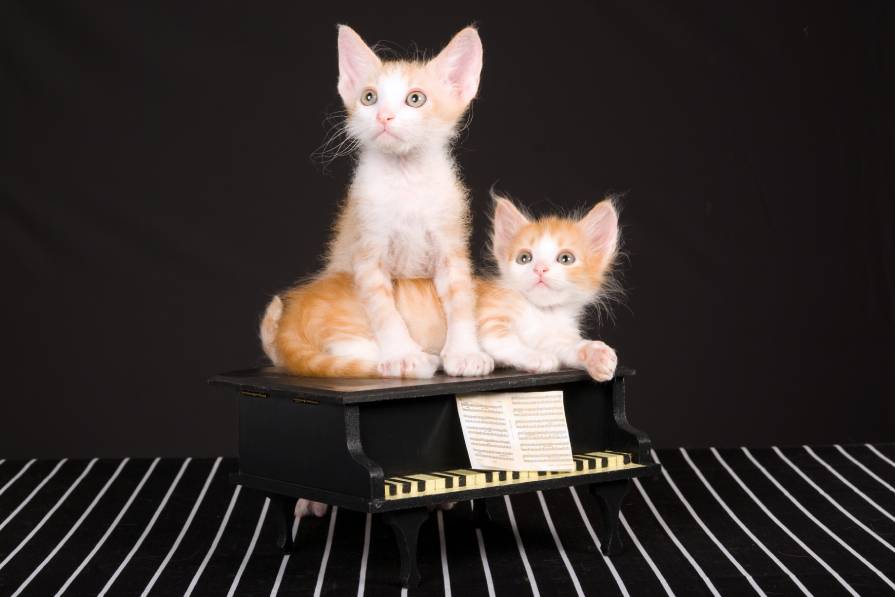
If you have ever been playing music and experienced your cat’s reaction to it, you may be wondering if they like the music or if the sound may be potentially annoying to them.
Cats do enjoy music, however, not human music. Cats have very different hearing frequencies than humans, and they do not hear the sound the same way as we do. Your cat will prefer listening to species-specific music that has been carefully composed just for your cat.
If you are interested in learning more about the type of music cats prefer, how to tell if your cat likes the music you play, and even some ideas on specific types of music to play for your cat, then this article is right for you!
 Understanding a Cat’s Hearing Range
Understanding a Cat’s Hearing Range
To understand why cats do not like human music, you must understand how their hearing works and compare it to the frequencies and hearing range of humans
The hearing range for an average domestic cat is between 48 Hz to 85,000 Hz, which is one of the broadest hearing ranges amongst other mammals. Cats can hear both high and low frequencies and can hear higher-pitched sounds in comparison to humans and dogs. A cat’s hearing is very sensitive, and it is easy to see why considering that humans have a hearing range of only 20 to 20,000 Hz.
Interestingly, their cone-shaped ears can amplify sound waves by two to three frequencies and have 32 muscles in their outer ears to help them pinpoint the sound. Keep in mind that a human only has 6 muscles in their outer ears, which makes a cat’s hearing range far more enhanced than humans.
We share the same lower hearing limit as cats; however, the upper limits of a cat’s hearing extend three times what the average human can hear, which is 64,000 Hz. Due to the differences in the way our ears work, sounds such as music may sound distorted to cats, and they do not hear songs the same way that humans do.
With this in mind, we can understand that human music is catered to our senses, but not other animals. Not only may some human music cause a stress response in your cat, but the vibrations produced by the bass in music are picked up through their whiskers which further enhances their dislike for some types of music.

What Types Of Music Do Cats Like?
Cats do not perceive music as we do, and they have different vocal, acoustic, and heartbeat ranges than us which affects how they hear and react to music.
Psychologists at the University of Wisconsin say that the trick to get your pets to listen to music is to play composing music that mimics the way they communicate. This can be compared to how humans do not understand cats meowing, and how your cat does not understand human speech. In this study, the researchers switched out the common drumbeat in human music (which typically replicates our heartbeat) to a purring tempo which cats are more familiar with. The songs were played for 47 domestic cats and researchers played close attention to how the cats reacted towards the various types of music.
The cats responded better to classical music with tempos that cats can sense, and this could be seen by the cats approaching the speakers and rubbing their scent across it, which indicates that they wanted to claim the object. This is a good indication that potentially proves cats will try to interact with the music they like through their body language.
The researchers wrote in a 2015 article that cats did not respond positively to standard human music, such as the type you hear on the radio. However, as soon as music specifically composed for cats played, they began to become interested.
Feline-Composed Music:
Cat-based music is also believed to have therapeutic benefits to our feline friends, which is why some pet shelters play music composed for pets to keep them calm and relaxed.
If you want to play the music that your cat likes, it is best to skip the human music for species-specific music which is better understood by cats, and possibly even enjoyed.
Here’s a good example of feline-friendly music by David Teie.

Soft Classical Music:
The soothing melody of classical music is tolerated by cats and seems to have a calming effect on them. The harmonious sounds have been known to slow down a cat’s fast breathing and heartrate, to induce a hypnotic, sleepy effect.
Tests have shown that music influences the nervous system in mammals which controls our cardiovascular function. In some instances, the music we listen to may even have effects on blood pressure and breathing and the same applies to cats.
Two examples of classical music cats may enjoy are Goldberg-Variations by Johann Sebastian Bach and La Mer by Claude Debussy.
What Music Should You Not Play Near Cats?
Any music with heavy bass can cause your cat to become stressed and uncomfortable. This is because they feel the heavy vibrations through their whiskers and their sensitive ears are overwhelmed with the high and low frequencies from the music.
It is best to avoid playing heavy metal or music with a strong bass near your cat. You may notice that their ears fold back and they try to escape the environment where the music is playing from.
Cats prefer gentle music with purring, suckling, or gentle subliminal beats because it reminds them of the comfort and security they got from nursing and cuddling with their mother, and harsh human music typically does not provide the same effect.

 Final Thoughts
Final Thoughts
Finding out that cats may like a type of music is intriguing. The research is done to determine whether cats like music provides a fascinating insight into specific species appropriate melodies that cater towards a particular animal’s way of communication.
Now that you have found out what types of music cats like, it is time to test out whether your cat responds to gentle melodies composed for felines so that you can make your own discovery! Some cats may react differently to music than others, so play a few different tunes to see which type your cat positively reacts to.
Related read:
Featured Image Credit: Ronnachai Palas, Shutterstock

 Understanding a Cat’s Hearing Range
Understanding a Cat’s Hearing Range



